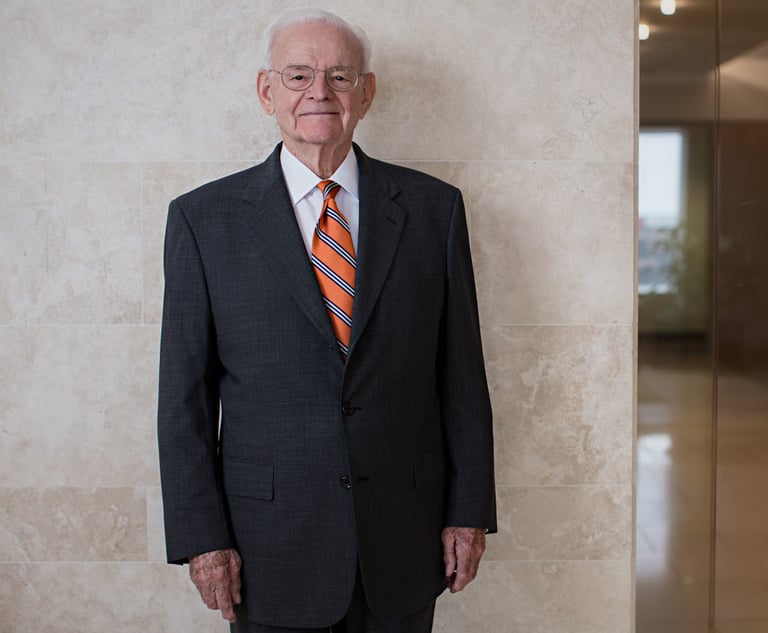 Montgomery County Court of Common Pleas candidate Daniel G. Ronca. Courtesy photo
Montgomery County Court of Common Pleas candidate Daniel G. Ronca. Courtesy photo Daniel G. Ronca Runs for Montgomery County Court of Common Pleas
'We must always be on guard for potential biases and prejudices, both personally and systemically and, when discovered, they must be routed out. Biases and prejudices have no place in the courtroom.'
April 07, 2023 at 03:38 PM
3 minute read
Candidate: Daniel G. Ronca
Court: Montgomery County Court of Common Pleas
Party: Democrat and Republican
Montgomery Bar Association rating: Highly recommended
The following has been edited lightly for length and style.
The Legal Intelligencer: Tell us about your background, where you went to law school, what firms you have practiced at, and areas of law you focus on.
Daniel Ronca: I received my J.D. degree from Temple Law School as a member of the Moot Court Honor Society. My legal experience, over 36 years, is as follows:
Assistant district attorney, Kings County, Brooklyn, New York; 1986-1990. Deputy attorney general, Pennsylvania, civil division; trial attorney; 1990-1993. Prudential Property & Casualty, trial attorney; 1993-2000. Rubin Glickman & Steinberg; associate; family law: 2000-2004. Cozen O'Connor; member; family law; 2004-2008. Sattin, Ronca & Cornelison; partner; family law; 2008 to present.
The Legal: What is one major thing about your career experience that most qualifies you for this position, and why?
Ronca: During my career, I have been fortunate enough to be able to completely focus, one at a time, on each of three of the major areas of trial practice which a Common Pleas Court judge would expect to see: criminal, civil and family. I tried a large number of jury and non-jury trials in both the criminal and civil arenas and an untold number of conferences, hearings and bench trials in my many years of family law practice.
The Legal: What is the main reason Pennsylvania voters should pick you?
Ronca: I am very proud to have been rated by the Montgomery Bar Association as being "highly recommended" to serve as a judge, which is the highest recommendation available. In order to receive this rating, at least 80% of the Montgomery Bar autonomous judiciary committee must determine that I possess superior qualifications to serve with distinction as a judge including, "an exceptional level of integrity, good moral character, industry, legal ability and experience, courtroom experience, humility and judicial temperament." This rating is based, in large part, on input from those attorneys against whom I have appeared in court as well as from judges before whom I have appeared.
The Legal: What will be your approach to moving matters efficiently through the case management system?
Ronca: The best way for an individual judge to efficiently move cases through the justice system is to be consistent in substantive and procedural rulings, so that there are very few surprises for litigants, and to give parties ample opportunity to settle cases during pretrial conferences with court assistance. However, if no settlement occurs before the trial date, the court must be prepared to hear the matter without delay. If this is done consistently, cases will have a better chance of settling before trial and, if not, they will be determined at trial by the court.
The Legal: What would you say to voters regarding your plans to ensure the equal administration of justice for all people?
Ronca: Equality before the law is, and must always be, a hallmark of our legal system. There can simply be no justice if litigants are not treated equally and equitably. We must always be on guard for potential biases and prejudices, both personally and systemically and, when discovered, they must be routed out. Biases and prejudices have no place in the courtroom.
The Legal: Where can voters go for more information about you?
Ronca: danroncaforjudge.com
NOT FOR REPRINT
© 2025 ALM Global, LLC, All Rights Reserved. Request academic re-use from www.copyright.com. All other uses, submit a request to [email protected]. For more information visit Asset & Logo Licensing.
You Might Like
View All
Superior Court Directs Western Pa. Judge to Recuse From Case Over Business Ties to Defendant
3 minute read
Saxton & Stump Lands Newly Retired Ex-Chief Judge From Middle District of Pa.
3 minute read
'Discordant Dots': Why Phila. Zantac Judge Rejected Bid for His Recusal
3 minute read
Judge Louis C. Bechtle: An American Jurist Who Relied on Common Sense, Sound Judgment and Fairness
5 minute readLaw Firms Mentioned
Trending Stories
- 15th Circuit Considers Challenge to Louisiana's Ten Commandments Law
- 2Crocs Accused of Padding Revenue With Channel-Stuffing HEYDUDE Shoes
- 3E-discovery Practitioners Are Racing to Adapt to Social Media’s Evolving Landscape
- 4The Law Firm Disrupted: For Office Policies, Big Law Has Its Ear to the Market, Not to Trump
- 5FTC Finalizes Child Online Privacy Rule Updates, But Ferguson Eyes Further Changes
Who Got The Work
J. Brugh Lower of Gibbons has entered an appearance for industrial equipment supplier Devco Corporation in a pending trademark infringement lawsuit. The suit, accusing the defendant of selling knock-off Graco products, was filed Dec. 18 in New Jersey District Court by Rivkin Radler on behalf of Graco Inc. and Graco Minnesota. The case, assigned to U.S. District Judge Zahid N. Quraishi, is 3:24-cv-11294, Graco Inc. et al v. Devco Corporation.
Who Got The Work
Rebecca Maller-Stein and Kent A. Yalowitz of Arnold & Porter Kaye Scholer have entered their appearances for Hanaco Venture Capital and its executives, Lior Prosor and David Frankel, in a pending securities lawsuit. The action, filed on Dec. 24 in New York Southern District Court by Zell, Aron & Co. on behalf of Goldeneye Advisors, accuses the defendants of negligently and fraudulently managing the plaintiff's $1 million investment. The case, assigned to U.S. District Judge Vernon S. Broderick, is 1:24-cv-09918, Goldeneye Advisors, LLC v. Hanaco Venture Capital, Ltd. et al.
Who Got The Work
Attorneys from A&O Shearman has stepped in as defense counsel for Toronto-Dominion Bank and other defendants in a pending securities class action. The suit, filed Dec. 11 in New York Southern District Court by Bleichmar Fonti & Auld, accuses the defendants of concealing the bank's 'pervasive' deficiencies in regards to its compliance with the Bank Secrecy Act and the quality of its anti-money laundering controls. The case, assigned to U.S. District Judge Arun Subramanian, is 1:24-cv-09445, Gonzalez v. The Toronto-Dominion Bank et al.
Who Got The Work
Crown Castle International, a Pennsylvania company providing shared communications infrastructure, has turned to Luke D. Wolf of Gordon Rees Scully Mansukhani to fend off a pending breach-of-contract lawsuit. The court action, filed Nov. 25 in Michigan Eastern District Court by Hooper Hathaway PC on behalf of The Town Residences LLC, accuses Crown Castle of failing to transfer approximately $30,000 in utility payments from T-Mobile in breach of a roof-top lease and assignment agreement. The case, assigned to U.S. District Judge Susan K. Declercq, is 2:24-cv-13131, The Town Residences LLC v. T-Mobile US, Inc. et al.
Who Got The Work
Wilfred P. Coronato and Daniel M. Schwartz of McCarter & English have stepped in as defense counsel to Electrolux Home Products Inc. in a pending product liability lawsuit. The court action, filed Nov. 26 in New York Eastern District Court by Poulos Lopiccolo PC and Nagel Rice LLP on behalf of David Stern, alleges that the defendant's refrigerators’ drawers and shelving repeatedly break and fall apart within months after purchase. The case, assigned to U.S. District Judge Joan M. Azrack, is 2:24-cv-08204, Stern v. Electrolux Home Products, Inc.
Featured Firms
Law Offices of Gary Martin Hays & Associates, P.C.
(470) 294-1674
Law Offices of Mark E. Salomone
(857) 444-6468
Smith & Hassler
(713) 739-1250





